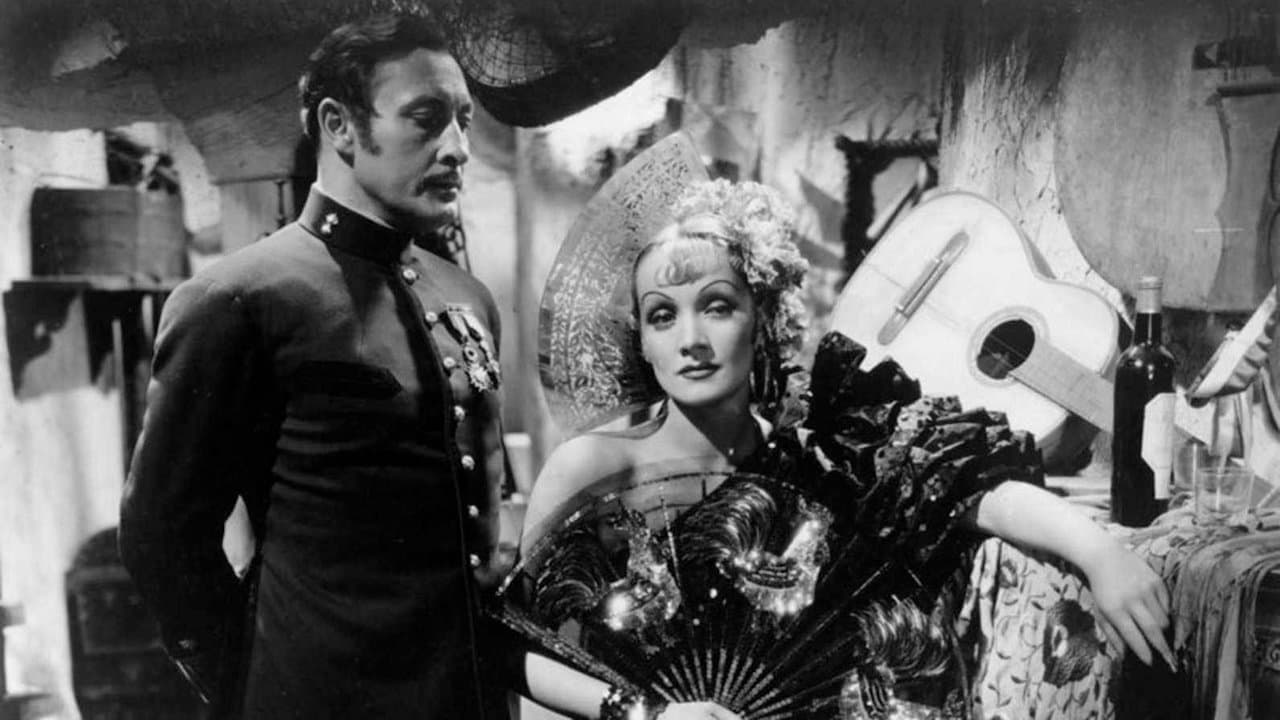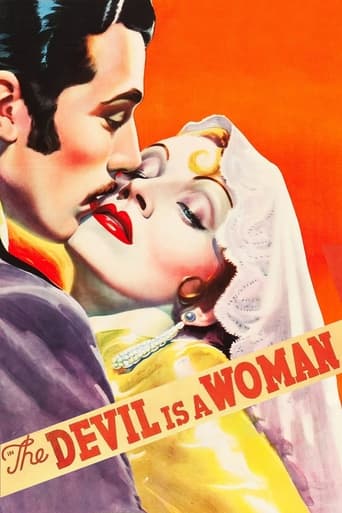

As has been pointed out, "The Devil is a Woman" from 1935 is a feast for the eyes with its settings, costumes, and Marlene Dietrich.The film is told in partial flashback and takes place at the beginning of the 20th Century.During carnival in Spain, Antonio (Cesar Romero), a republican revolutionary, who has been exiled, arrives from Paris to participate in the festivities. He also visits with his friend Captain Don Costelar (Lionel Atwill), known to his friends as Pasqualito.Antonio meets Concha, a nightclub singer, and arranges to meet her later. Pasqualito, however, tells him that he had a relationship with Concha, and she ruined his life. Thus begins the flashback, where he tells Antonio what happened and makes his friend promise that he will never approach the greedy, heartless, cold Concha.This was the last von Sternberg-Dietrich collaboration. von Sternberg fills the screen with confetti, balloons, crowds, and people wearing outrageous masks. It's all very frenzied and filled with excitement.This little story is from a novel called "The Puppet Woman." Which she is. Dietrich is stunning as Concha, who flirts, cajoles, and indulges in dramatics in order to get who -- and what -- she wants. It's usually an older man with money, whom she corrals, takes up with a younger man, and leaves the older one. She is costumed in the most outlandish way tilted hats with brims that go out three feet, lace gowns. She's amazing.Both Cesar Romero and Lionel Atwill as her suitors are wonderful - Romero, as Antonio, is wanted by the police so he walks around a lot of the time resembling Zorro.Edward Everett Horton is the Mayor, also madly in love with Concha. He's hilarious as he yells at the police and is disgusted by the carnival. This film is only 80 minutes and well worth seeing. If you have read Maria Riva's book about her mother, there was an incredible amount of time taken with closeups and lighting, and she could hold a position for an unheard of amount of time. You'll see how immaculately she is photographed in this film.
... View MoreHollywood had a shortage of balloons, streamers and bags of confetti after Josef Von Sternberg used tons of it for this, his seventh and last movie with the exquisite Marlene Dietrich. As overstuffed as a piñata, this extremely elaborate melodrama tells the story of a she-devil who uses men like toilet paper and discards them just as fast. She's the toast of Spain, an entertainer so consumed with the need to use men that she drives them mad with passion, jealousy and revenge. In one of his few non-horror lead roles, Lionel Atwill is her most brutally abused lover, used by her financially and emotionally to the point where he turns homicidal.Even more dangerous than Carmen, Dietrich is obviously enjoying playing the chicanery of this extremely evil woman. Cesar Romero is the other object of her obsessions, warned by Atwill and unheeding his advice. Of course, Atwill has his own agenda and in the end, everybody's lives are on the verge of being ruined. Alison Skipworth is funny as Dietrich's overly dressed matronly mother, with Edward Everett Horton as the head of the law enforcement during a Mardi-Gras like street fair, also under Dietrich's spell.As entertainment, it's pleasing to the eye and totally outrageous; As a moral lesson, it is a valuable tale of the wages of sin, but as art, it is a violation to that famous saying, "Less is More", its costumes, sets and props more camp than culture, more stylish than substance. Dietrich is still lovely in her exotic costumes and make-up, beautifully photographed but suffering a story where the characters don't get any sympathy, only pity, making it over Freudian and rather high brow.
... View MoreIn the carnival in Spain in the beginning of the Twentieth Century, the exiled republican Antonio Galvan (Cesar Romero) comes from Paris masquerade to enjoy the party and visit his friend Capt. Don Pasqual 'Pasqualito' Costelar (Lionel Atwill). However, he flirts with the mysterious Concha Perez (Marlene Dietrich) and they schedule to meet each other later. When Antonio meets Pasqualito, his old friend discloses his frustrated relationship with the promiscuous Concha and her greedy mother (Alison Skipworth) and how his life was ruined by his obsession for the beautiful demimondaine. Pasqualito makes Antonio promise that he would not see Concha. However, when Antonio meets Concha, she seduces him and the long friendship between Antonio and Pasqualito is disrupted. "The Devil Is a Woman" is the last movie of director Josef Von Sternberg and Marlene Dietrich together. The romance tells the story of a cold- hearted dancer that has a promiscuous life and is financially supported by her obsessive lover in an unrequited love. The man ruins not only his professional life, but also his long friendship with Antonio. Marlene Dietrich is beautiful in this film and the role seems to be tailored to her. The excellent cinematography in black and white is very impressive. My vote is seven.Title (Brazil): "A Mulher Satânica" ("The Satanic Woman")
... View MoreThis is at best a confusing movie. The novel on which it is based, a minor classic of masochism, is the story of a Spanish nobleman who falls in love with a strange woman, Concha. She keeps leaving him, and so angers him that he finally beats her. She likes it, and the rest of the novel consists of his learning this and trying to come to terms with it.That, of course, was not going to work in post-Hayes Code Hollywood. There is a slight inkling of it after Lionel Atwil beats Concha once, but it is never developed. We therefore really have no idea why she doesn't go off with the far more handsome Cesar Romero at the end.So, what we have left are a lot of nicely shot black and white images - Sternberg knew how to shoot for the image - and the most remarkable series of outlandish costumes on Dietrich that Hollywood could provide. She plays Concha as petulant and that finally becomes obnoxious. So, as with some of the other Sternberg-Dietrich creations, this is best watched with the sound turned off. Fun to watch, but more show than substance.
... View More